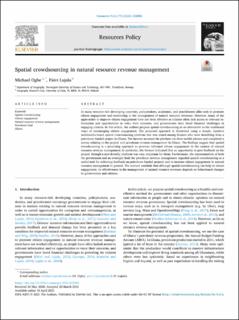| dc.contributor.author | Ogbe, Michael | |
| dc.contributor.author | Lujala, Päivi | |
| dc.date.accessioned | 2022-05-09T14:40:05Z | |
| dc.date.available | 2022-05-09T14:40:05Z | |
| dc.date.created | 2021-04-12T21:20:15Z | |
| dc.date.issued | 2021 | |
| dc.identifier.citation | Resources policy. 2021, 72 . | en_US |
| dc.identifier.issn | 0301-4207 | |
| dc.identifier.uri | https://hdl.handle.net/11250/2994861 | |
| dc.description.abstract | In many resource-rich developing countries, policymakers, academics, and practitioners alike seek to promote citizen engagement and monitoring in the management of natural resource revenues. However, many of the approaches to improve citizen engagement have not been effective as citizens often lack access to relevant information and opportunities to voice their concerns, and governments have faced financial challenges in engaging citizens. In this article, the authors propose spatial crowdsourcing as an alternative to the traditional ways of encouraging citizen engagement. The proposed approach is illustrated using a simple, intuitive multimedia-based spatial crowdsourcing platform that was tested among farmers who were benefiting from a petroleum-funded project in Ghana. The farmers accessed the platform via their mobile phones and completed a survey relating to the project and petroleum revenue management in Ghana. The findings suggest that spatial crowdsourcing is a promising approach to promote informed citizen engagement in the context of natural resource revenue management. In particular, the farmers indicated that an opportunity to give feedback on the project through a user-friendly platform was very important for them. Furthermore, the representatives of both the government and an oversight body for petroleum revenue management regarded spatial crowdsourcing as a useful tool for collecting feedback on petroleum-funded projects and to increase citizen engagement in natural resource management in general. The authors conclude that although spatial crowdsourcing can help in citizen engagement, its effectiveness in the management of natural resource revenues depends on behavioural changes in governments and citizens. | en_US |
| dc.language.iso | eng | en_US |
| dc.publisher | Elsevier | en_US |
| dc.rights | Navngivelse 4.0 Internasjonal | * |
| dc.rights.uri | http://creativecommons.org/licenses/by/4.0/deed.no | * |
| dc.title | Spatial crowdsourcing in natural resource revenue management | en_US |
| dc.title.alternative | Spatial crowdsourcing in natural resource revenue management | en_US |
| dc.type | Peer reviewed | en_US |
| dc.type | Journal article | en_US |
| dc.description.version | publishedVersion | en_US |
| dc.source.pagenumber | 11 | en_US |
| dc.source.volume | 72 | en_US |
| dc.source.journal | Resources policy | en_US |
| dc.identifier.doi | 10.1016/j.resourpol.2021.102082 | |
| dc.identifier.cristin | 1903661 | |
| cristin.ispublished | true | |
| cristin.fulltext | original | |
| cristin.qualitycode | 1 | |

